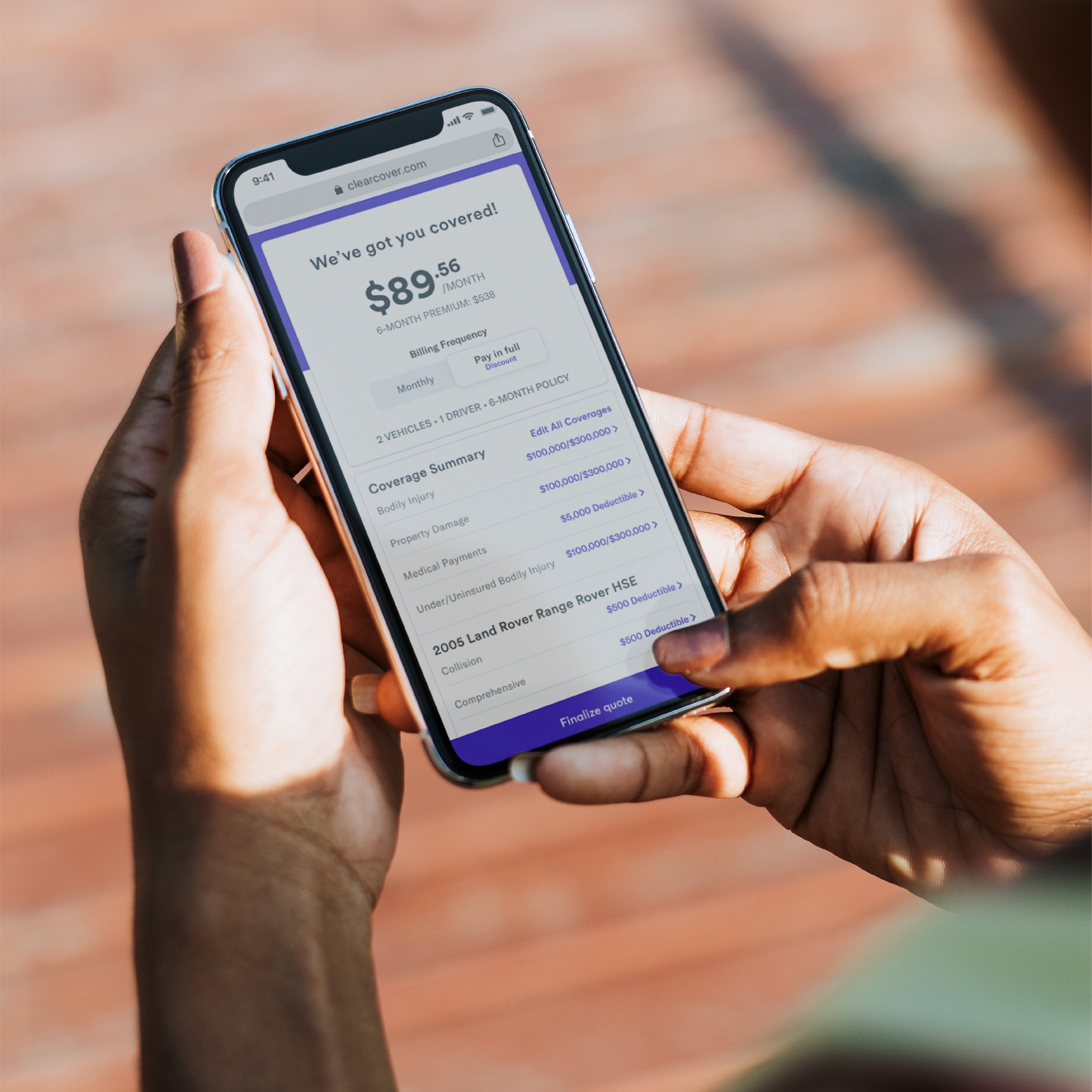What Is No-Fault Insurance?
Written by Team Clearcover
Car insurance can often feel complex and unclear, full of tricky terms and technical jargon that end up making you feel more confused than before. It shouldn't have to be that way. At Clearcover, we’re setting out to make insurance easy. To give you a better understanding of the coverages you might see on your auto insurance policy, we’re breaking down the topics that tend to cause confusion.
One coverage that can raise questions is no-fault insurance.
The concept is pretty simple, but it can be tough to understand who qualifies for coverage and what the insurance covers. No-fault insurance (also known as personal injury protection or PIP, or First Party Benefits or FPB) is a component of auto insurance policies in many states. The specific benefits can vary from state to state, but it generally pays for medical-related expenses, lost wages, and other benefits after an accident. It covers you regardless of who caused the accident.
At Clearcover, we’re committed to simplifying insurance.
In this article, we’ll break down no-fault insurance coverage to help you get a clearer understanding of what it is, what it covers, and which states require it.
Once you’re familiar with no-fault insurance, check out these quick, 5-minute reads:
· Why, when, and how to change car insurance companies
· How do you find the right car insurance company
What Does No-Fault Insurance Cover?
No-fault insurance comes into play when there are injuries in a car accident, even if they aren't severe or life-threatening. This insurance coverage aims to cover medical bills and expenses you face due to an accident.
Personal injury protection isn't designed to cover damages to your car (you'll want collision coverage for that), nor does it cover people outside of your vehicle (your liability coverage handles that). Instead, no-fault coverage takes care of you, regardless of who caused the accident.
Let's look at a few scenarios where this coverage would usually come into play. Keep in mind, PIP coverage varies from one state to the next. However, these examples should give a general idea of how coverage may work:
· Medical Bills: Let's say your accident left you with a broken wrist, requiring an emergency room visit, x-rays, and follow-up treatment. PIP coverage steps in to help with the medical costs associated with that treatment.
· Lost wages if the accident leaves you unable to work: Say an injury accident leaves you out of work for a few days while you recover. In this situation, no-fault coverage can help replace that lost income. This doesn’t reimburse you for lost wages when you can't make it to work because your car is being worked on after an accident, though. That's where Alternate Transportation coverage shines. Alternate Transportation coverage can provide you with a vehicle to get to and from work so you don’t lose wages in the first place.
· Final expenses in the event of loss of life: When an accident results in a fatality, personal injury protection coverage can help cover funeral expenses and other associated costs.
· Survivors Loss: Again, in the unfortunate event of a fatality, the surviving spouse may face unforeseen expenses or lost income within the household. No-fault car insurance can help with the economic losses they experience.
· Childcare and Home Assistance: When an accident leaves you unable to take care of your daily duties, your personal injury protection coverage can help offset the cost of babysitters, daycare, grocery shopping services, and other related expenses.
As you can see, this versatile coverage can help cover the financial impact of injuries from an auto accident in many scenarios. However, it all comes down to one thing: no-fault insurance covers the expenses you incur after an injury accident.
How Does No-Fault Insurance Work?
With no-fault insurance, you'll have a set amount of coverage in your car insurance policy. Your insurance company is responsible for covering medical expenses and associated costs required by your state up to that limit. After meeting this threshold, an injured party will need to seek compensation from the at-fault driver's insurance company or cover them directly. If the at-fault driver happens to be uninsured or underinsured, your uninsured/underinsured motorist coverage can step in to help fill that coverage gap.
How to File a PIP Claim
When a car accident results in an injury, you will notify your own insurance company of your need to open a no-fault insurance claim.
When you have no-fault insurance coverage, your auto insurance company will usually request copies of any medical bills incurred from the car accident injuries. Of course, the same applies to your passenger's medical expenses as well, so it's a good idea for everyone to maintain documentation.
Sometimes, there may be a deductible before your PIP coverage pays out. This deductible can vary from one policy to the next, so you'll want to ask your car insurance company about your specific deductible. In many cases, insurance providers will subtract your deductible from the amount of your claim. For instance, instead of paying your insurance company a $250 deductible and then being reimbursed $1,000 for covered medical expenses, you would simply receive $750.
No-Fault Insurance by State
Like many other elements of auto insurance, no-fault coverage options and requirements vary from state to state.
For instance, some states require a certain amount of PIP coverage to be carried through an auto insurance policy. There is a lot of nuance from state-to-state, so we won’t get too far into the weeds here. When reviewing your auto insurance coverage, a knowledgeable insurance agent will be sure to get you at least the minimum amount of PIP coverage to meet your personal needs and the state requirements.
Now let’s take a look at which states require no-fault insurance, which states allow the coverage, and which states do not allow it as a coverage option.
There are 12 states that require PIP coverage, and one that requires First Party Benefits. Here’s a breakdown of the states that require PIP coverage and the minimum amount of coverage they require:
*If you’re a resident of this state, you’re in luck! Clearcover provides coverage in your state.
A Note on Pennsylvania
In Pennsylvania, PIP coverage is referred to as FPB (First Party Benefits) and is required by law. However, Pennsylvania is a “choice no-fault” state, which means that drivers can choose a “full tort” or “limited tort” policy. Limited tort policies are less expensive, but limit the individual's ability to sue the other driver.
The following states allow no-fault insurance coverage but do not require it. Interestingly enough, even though the coverage itself is not required, there are still minimum coverage amounts if you choose to include PIP coverage with your policy.
*Clearcover provides coverage in this state.
Remember, coverage amounts and deductibles can vary from state to state. If you have any questions about the coverage options available to you, our licensed agents are here to help!
The Cost of No-Fault Insurance
Auto insurance policies are comprised of numerous coverage options and types, all designed to protect you and your risks. Most items within a policy will have a specific cost associated with them or a series of coverages built into a bundled package, and no-fault coverage is no different.
The cost of personal injury protection coverage will vary from one person and policy to the next. Factors that can impact your rate include driving history, vehicle type, and more.
One of the most significant factors in a no-fault insurance policy will be the amount of coverage issued and the deductible, which is a set amount you must pay out-of-pocket before an insurer covers any expenses. Your deductible will affect your monthly premiums as well, so it’s important to keep this information in mind when choosing PIP coverage.
Choose Clearcover for No-Fault Insurance
To sum things up, no-fault insurance (PIP/FPB) helps pay for the costs resulting from an injury in a car accident. Claims are paid to you by your insurance company. And, as the name suggests, it doesn't matter who caused the collision.
Now that you understand how clear your coverage can be, let Clearcover help you build the car insurance policy that's right for you. Our technology-first platform puts you in control of smarter, faster car insurance.
Take control of your coverage and see what you can save by switching to Clearcover.






